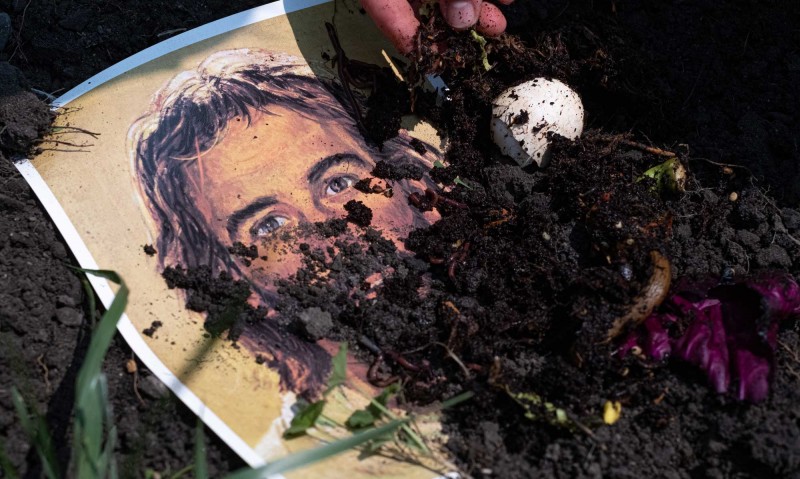Compost the Church

Lucia Wylie-Eggert and Geez staff, “To Dirt You Shall Return” July 2021, Photo.Compost the Church
History reveals the that theology is more than a personal experience with God.
“It is not too much to say that whoever wishes to become a truly moral human being . . . must first divorce [themself] from all the prohibitions, crimes, and hypocrisies of the Christian church. If the concept of God has any validity or any use, it can only be to make us larger, freer, and more loving. If God cannot do this, then it is time we got rid of Him.”
– James Baldwin, The Fire Next Time
For centuries upon centuries, Christian theology has been commandeered to create and uphold innumerable systems of oppression. From Constantine’s imperial propaganda to the Crusades, to colonization and the Doctrine of Discovery, to slavery and internment and genocide, to capitalism, institutional racism, transphobia, homophobia, residential schools, zionism, state violence . . . The list of Christian “prohibitions, crimes, and hypocrisies” feels nearly endless.
History reveals that theology is more than an abstract, personal experience or study of God. Theology – our understandings of divinity, our ideas of what holds value, the ways we relate to land and community and the Great Mystery around us – becomes what we do. And when oppressive theologies become institutionalized, as they have, they wreak violence on real communities, real land, and real bodies.
Today, white supremacist theology is baked into the structures and systems of this world, and therefore into each of our lives. Whoever we are, however we are coming to these pages, we each hold different relationships to whiteness, to Christianity, and to the institutional church. While all of us hold a different posture, none of us escape the devastating realities of these entwined powers.
With such a violent history, and within the current political and theological landscape of our time, how and why would we dare to continue claiming Christianity? For us, we make the decision daily to trust that our faith is not solely represented by its violent history. Resting on the margins and in the cracks of community, we feel power and beauty and imagination and a deep unquenchable thirst for justice. We trust in an embodied prayer that reverberates backward and forward through the generations.
And for many of us, this tradition is also our ancestry . . . it is our history to grapple with. We know that for some folks, the trauma is too deep and the only way to heal is to break away from Christianity and the institutional church. But for those of us who remain rooted in this tradition – and for white folks in particular – we believe our work, in part, is to stay with the stories. As James Baldwin wrote, “to know whence we came.” To remember. To honour. To mourn. To practice active repentance. To rejoice. To listen. To embody rituals of our ancestors. To keep on the margins. To lift up a theology of liberation. To keep gathering and creating new stories that become Gospel. To wrestle every day against the principalities of whiteness and nationalism that poison Christianity and murder so many in their wake.
So we struggle. These pages reverberate with pain and possibility. As cries against white supremacy sound in our streets and in our work, we must face its brutal reality written into Christianity.
It is time . . . it is past time . . . to compost this shit.
May the toxic theologies that have haunted us be metabolized into justice and community. May that which never should have been return to the dirt. May what has destroyed life grow instead into that which gives life. We pray that one day we will all be able to lay down on the earth rejoicing in new sprouts carrying ancient wisdom, generational healing, and a faith that gives us courage to sing.
Kateri Boucher is a white settler living on Anishinaabe land. She is associate editor of Geez and a member of Detroit’s Catholic Worker community.
Lydia Wylie-Kellermann is the editor of Geez and lives in Detroit, Michigan. The powers dwell in and around her as a white U.S. citizen and Christian.


Start the Discussion